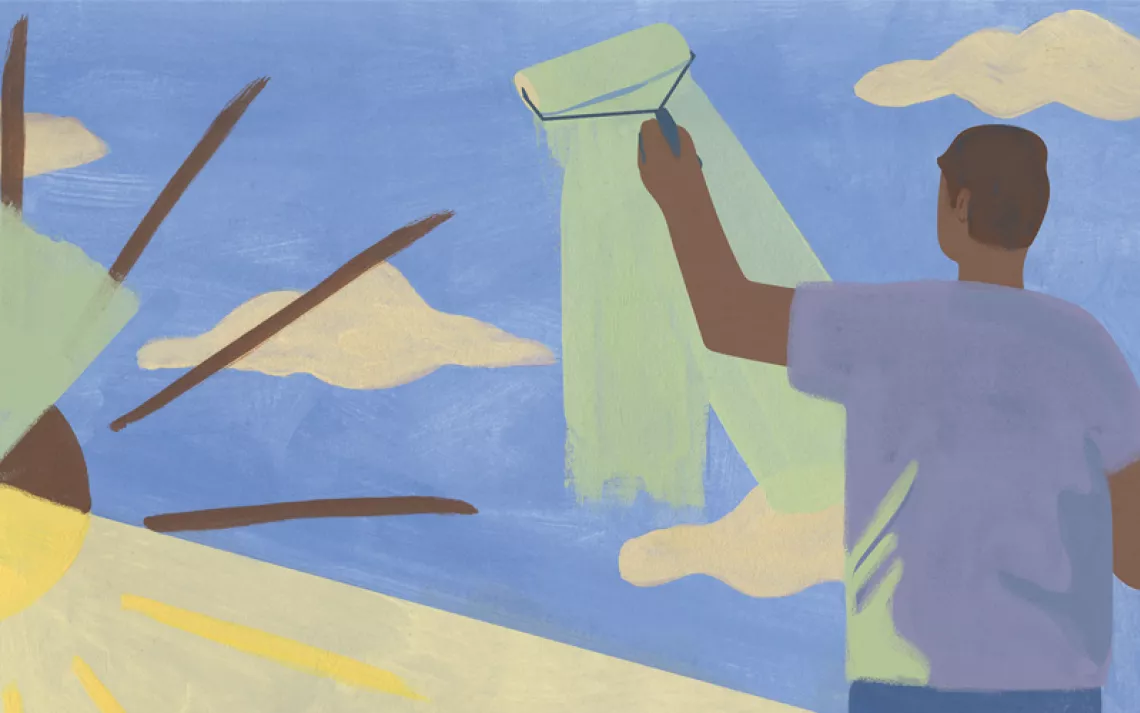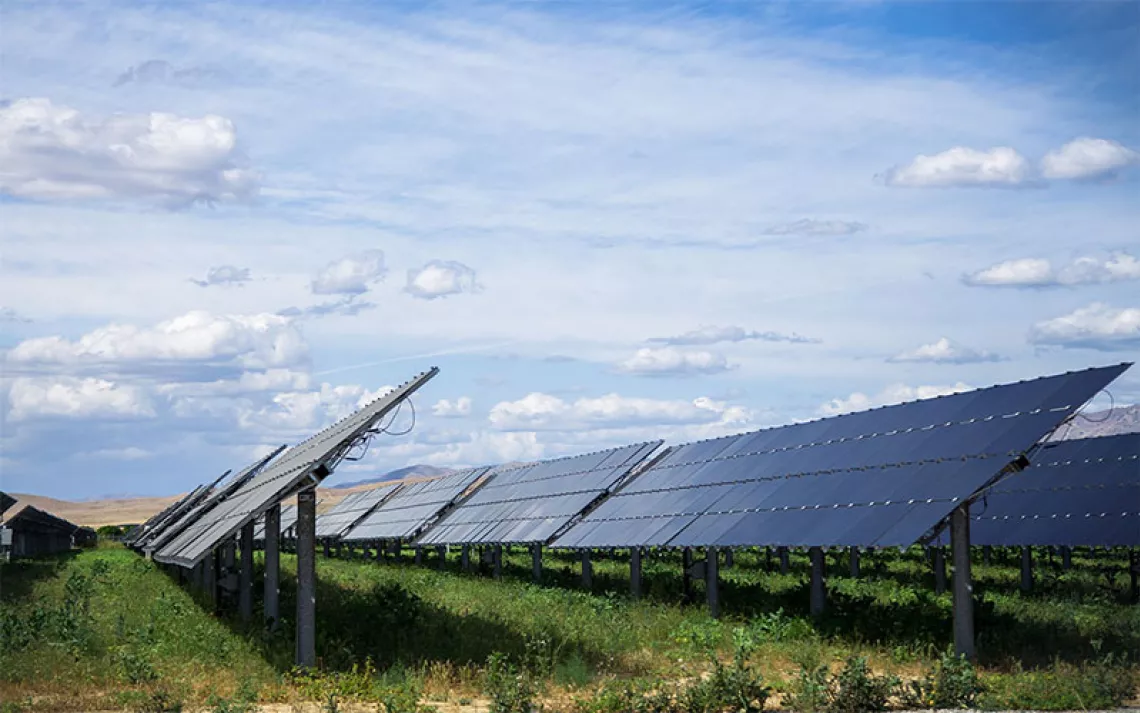The Elephant in the Shopping Mall: Q&A with author and rewilding activist George Monbiot

An epidemic prowls largely undiagnosed throughout our cities and towns: ecological boredom. When Feral author George Monbiot spotted the symptoms in himself, he embarked on a radical, experimental cure. He began rewilding from the inside out.
Feral (October 2014, University of Chicago Press) brings together field notes, research, and reflections from the frontlines of the rewilding movement. Monbiot does not wallow in the fossilized remnants of what we have lost. From Mynedd yr Ychen in the Welsh mountains, to the steppes of Siberia, in a kayak or in the bushes, he uncovers signs of hope that if we give nature what she wants, a wilder world can be ours in the future.

Sierra: Feral presents a definition of rewilding that emphasizes giving nature the reins. But we have to intervene a bit in the beginning, pulling down fences, reintroducing species, etc. to kick off the process. What is the point at which we take our hands off and let the new wilds begin their self-willed existence?
George Monbiot: As early as possible, but we do have to bring back those missing elements. Of critical importance to this is the keystone species, the animals whose ecosystem impact is greater than their numbers suggest. Classic examples are wolves, beavers, and great whales. We have to remove the impediments to rewilding such as fences, drainage ditches, anything that prevents ecosystems from returning to a self willed state. Rewilding is not about trying to create an end state or a fixed outcome such as a rainforest or a meadow or a kelp garden. The outcome is a process. It’s about trying to optimize ecological processes and then allowing those processes to deliver whatever outcomes they happen to produce. That's the opposite of certain models of conservation, which are about keeping ecosystems in a state of arrested development, privileging certain assemblages of species at the expense of others. Why do we believe the natural world is better with human intervention than without it? As a friend of mine asked sardonically: “How did nature cope before we came along?”
S: In Feral you describe a rewilding project in the Siberian tundra that attempts to combat climate change. Is rewilding a viable tool in the ongoing climate battle?
GM: The evidence is contradictory in Siberia, but elsewhere in the world, yes, there are several important respects in which rewilding interacts with the issue of climate change. More trees and more large animals can lead to more greenhouse gases being removed from the atmosphere. Great whales appear to have a significant role in climate change mitigation. The tremendous plumes that they produce close to the surface fertilize blooms of plankton that sink down into the abyss, taking a lot of carbon with them. So the more whales we have, the more of an impact on mitigating carbon concentrations we might have. You could see the return of the great whales as a benign form of geoengineering. Self-willed ecosystems that we’re not trying to control are likely to be far more resilient to global warming than highly managed conservation sites where we’re trying to promote only a few species. Rewilding allows ecosystems to respond and adapt to climate change. But it is important to note that even the maximum possible rewilding would not be sufficient to counteract the burning of fossil fuels, which is roughly an order of magnitude greater.
S: You say in the book that rewilding should be driven by human needs, not ecosystem needs. Is there an element of rewilding that is selfish?
GM: Oh yes, I want to see a world that is fascinating and enchanting, where I feel my spirit moved. To an extent that is a selfish impulse, though I want to see that for other people, for the benefit of humanity in general. A real conflict, of course, is between that and a more ecocentric position, which argues that we should do this for the sake of the world. The reason I hesitate over that position is that it’s hard to step back sufficiently to say: “This is what the natural world might want.” We’re likely to project our desires on the natural world. Whether we do this for our own aesthetic delight, the outcome is the same. It doesn’t matter what your motivation is, if what you’re working towards is a wilder, freer, more self-willed world with more keystone species, then I’m happy if people want to call that an outcome of ecocentricity or anthropocentricity.
S: You have a young daughter. Is rewilding a way of giving our children a better planet than we started with?
GM: For me one of the great attractions of rewilding is that it’s a positive vision of the natural world. As environmentalists we are very good at spelling out what we don’t like, what we’re against rather than what we’re for. Our message has been: “Follow us and the world will be slightly less awful than what it has been,” which isn’t exactly inspiring. What rewilding says is: “Follow us and the world can be much better: more thrilling and more wonderful and more enchanting than it is at the moment.” This is not to say we should stop campaigning against the bad stuff. But if we don't want to burn out, we must offer a positive vision. That helps sustain people’s interest in the natural environment and sustain their energy to campaign against the bad stuff. That is hope. That is the great missing element in environmentalism. Rewilding reintroduces hope.
S: Are children especially affected by ecological boredom and the need for rewilding?
GM: I feel this very strongly indeed since I’ve started working with an outdoor education charity in the UK. We take children from deprived backgrounds in the cities, children who have never seen the countryside before, never seen the sea before, we go to places where nature has still got some wild characteristics. It’s just fascinating to see how quickly the children come out of their shells. They need very little persuasion. They know instinctively how to have fun in the countryside. It’s also very interesting to see how children who are failing in school can succeed completely in the natural environment. At school we reward a narrow set of skills that we insist they excel at. Children who just don't get on with those disciplines at school, as soon as they’re in a stimulating natural environment, show all kinds of intelligence and intuition and engagement.
S: Your book skillfully interweaves scientific evidence with emotional resonance. Do you see this as a model for rewilding action itself?
GM: Yes, I believe that I tried to some extent to rewild my writing while I was working on Feral. There’s an element of letting go. Some of my previous books were more involved with pontifications, and investigating the technical aspects of ecosystems. This has been a much rawer and much richer process. There’s also an element of rewilding myself in writing the book. It has been a tremendous exercise in rekindling delight and wonder. I compare it to stepping through the back of the wardrobe. It feels like passing through a portal into an enchanted kingdom. All ecosystems are inherently megafaunally dominated but in almost all cases we have wiped out the megafauna, and understanding that was the key to understanding ecosystems. Wherever you are, even in the tamest places on earth, the shopping malls, you are in places that, in very recent times, ecologically speaking, were dominated by elephants and lions and rhinoceros and thirty-foot monitor lizards and marsupial lions or elephant birds. The megafauna were everywhere.
S: Trophic cascades—the domino effect that animals at the top of the food chain can initiate, reshaping entire ecosystems and landscapes—are a major theme in Feral. It seems as if by choosing to reintroduce certain key predators, humans have a chance to play God, completely changing the rules by which a particular ecosystem lives.
GM: I would put it the other way round. We’re restoring the rules; we’ve changed the rules radically by removing those keystone species. We’ve created ecosystems that bear little resemblance to how ecosystems behave in nature. Rewilding restores previous ecological function. In some ways we're saying: “Let’s stop playing God. Let’s stop seeing our footprint everywhere we go. Let’s see some other footprints.”... Preferably some rather large ones... the kind that elephants make.
 The Magazine of The Sierra Club
The Magazine of The Sierra Club



